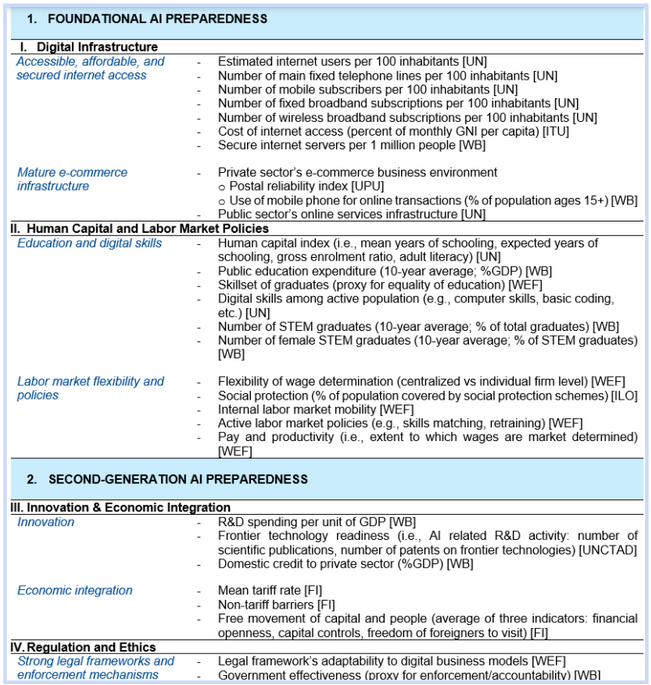News excerpt:
The International Monetary Fund (IMF) launched an Artificial Intelligence Preparedness Index (AIPI) Dashboard, evaluating 174 economies worldwide for their AI readiness.
About Intelligence Preparedness Index:
- The Index assesses countries based on Digital infrastructure, Human capital, Labor policies, Innovation & Economic Integration, and Regulation and Ethics.
- The given image shows the broad categories and various reports from institutes / organizations such as World Bank (WB), United Nations (UN), World economic forum(WEF), International Labour Organization(ILO) , International Telecommunication Union(ITU), Science, technology, engineering, and mathematics(STEM);Universal Postal Union(UPU) used by IMF to prepare the AIPI.

Key Findings:
- The AIPI categorizes countries into Advanced Economies (AE), Emerging Market Economies (EM), and Low-Income Countries (LIC).
- India is categorized as an EM with a 0.49 rating. India ranks 72 in a total of 174 countries, with Bangladesh (0.38) on 113, Sri Lanka (0.43) on 92, and China (0.63) on 31.
- Singapore (0.80), Denmark (0.78), and the United States (0.77) are among the highest-rated AEs.
AI's Impact on the Global Economy:
- IMF research indicates that AI is set to reshape the global economy, potentially endangering 33% of jobs in advanced economies, 24% in emerging economies, and 18% in low-income countries.
- Despite these risks, AI also holds immense potential to enhance job productivity, create new roles, and establish new industries.
Disparities in AI Adoption:
- Emerging market economies and low-income countries typically have fewer high-skilled jobs than advanced economies, suggesting they may experience fewer immediate disruptions from AI.
- However, these countries often lack the necessary infrastructure and skilled workforce to fully benefit from AI, potentially exacerbating global inequality.
- The IMF's analysis highlights that wealthier economies are generally better equipped for AI adoption compared to low-income countries.
- The varied stages of AI readiness across countries highlight the need for tailored policies to manage risks and maximize benefits.
Addressing Inequality:
- Policymakers are urged to take proactive measures to mitigate the inequality.
- The AIPI Dashboard aims to provide valuable insights for policymakers, researchers, and the public to assess AI preparedness and formulate policies that ensure AI advancements benefit all sectors of society.
Way Forward:
- Expanding social safety nets.
- Invest in worker training.
- Prioritize AI innovation and integration.
- Strengthen regulations to protect against potential risks and abuses.
- By coordinating globally, countries can build trust in AI and work towards inclusive and equitable AI adoption.
|
Artificial Intelligence (AI) refers to the simulation of human intelligence in machines that are programmed to think and learn like humans. Some common Application of AI include:
|


